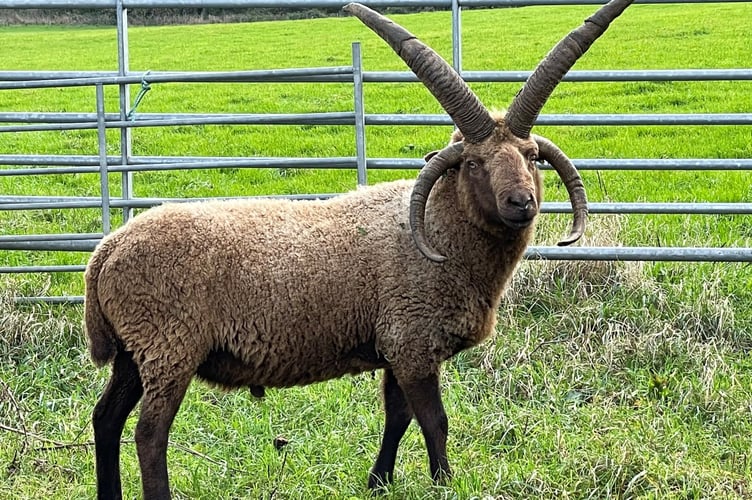A delicious salami using loaghtan meat is the latest step on a long journey towards securing the future of the island’s rare breed sheep.
Manx Loaghtan Produce, run by Jenny Shepherd and Rawdon Hayne from Ballacosnahan Farm in Patrick, has been awarded the ‘Product Of’ provenance label for its special charcuterie.
Customer reaction for the salami and the quality of the Loaghtan meat, described as a port colour with generous marbling and a deep flavour, has been swift and very favourable.
‘It’s taken us a bit by surprise,”’ said Jenny. ‘Not the “Product of” award, as it’s pure Manx – but the speed with which we have sold out when we haven’t even advertised it.
‘We eat far too much of it ourselves,’ she joked, before adding: ‘It’s delicious.’
The couple sell a range of loaghtan meat from their farm shop, including joints, legs, boned and rolled shoulder, burgers, sausages and loins.
‘The loin is the fillet steak of loaghtan,’ said Jenny. ‘That’s the prime cut – I defy anyone not to like it.’
They hope the salami will prove another way of showing people how commercially viable the hardy Manx-bred sheep can be.
‘The charcuterie is a way of adding value to the meat, as well as being something we enjoy.’
A salami using Loaghtan meat had been started by Steven Rideway at Close Leece Farm as one part of a range of charcuterie he developed, with other products such as chorizo and nduja using meat from rare breed Tamwith pigs. The charcuterie garnered a host of Best Taste Awards from 2017 to 2021.
But a combination of factors sparked by the pandemic, including spiralling costs and changing customer habits, saw the Close Leece Farm Shop and Cafe close its doors in September last year.
Jenny and Rawdon thought it was important to see if the loaghtan salami could be retained.
‘We were always interested in charcuterie. We saw Steven, we brought his equipment, and he helped us with the first few batches,’ she said.
They started their first batch in December, just before Christmas. Initial tasting reactions were that people liked it, but Jenny and Rawdon felt they could do better, so they tweaked the recipe slightly.
‘The second lot was absolutely spot on, which we finished in March, and which sold out really quickly,’ said Jenny. ‘A batch takes about five weeks, you can’t hurry it due to the curing process, so we are looking at ways to increase production.’
For 20 years, since she was given six Manx Loaghtan ewe lambs in 2003, Jenny has worked to build her flock. In what could be a clear indicator for the proof of nominative determinism – the theory that people tend to gravitate towards jobs that fit their names – she now has the largest Loaghtan flock on the island.
‘That makes us now the largest flock in the world,’ she said. ‘I’d rather not have that accolade, I’d rather there were more loaghtans.
‘You just have to get on with it, don’t you.’
The hardy, multi-horned face of the loaghtans provides a popular visual symbol for the island.
But Jenny feels there’s more lip service paid to their value as a promotional tool, rather than financial help. She keeps in touch with other countries who have their own ancient breeds, such as Iceland, Greenland and Norway.
‘Every single one of those places, the government gives a subsidy for keeping the ancient breeds going,’ she said. ‘They are shocked to hear that we get nothing like that, that there is no aid to protect our heritage.
‘The Isle of Man is good at saying how important they are, but they do nothing, really, to help secure their future.’
While creating a demand for the meat is important – loaghtan meat is a dark colour, finely grained and low in cholesterol, with much less fat than modern sheep – Jenny and Rawdon have concentrated on selling their wool as a premier product.
They established a breeding programme aimed at producing quality wool – Jenny has been a recurring winner of the best Manx Loaghtan fleece category at the Royal Manx Agricultural show since she first entered in 2006 – and their big breakthrough came when their weaver told them that their wool was good enough to be spun as single ply.
This has enabled their range of finely-woven blankets, each one containing 1kg of wool, to be made.
They have built a thriving business selling wool, knitting kits, shawls and blankets and sheepskins through their online shop, with the USA and Scandinavian countries proving big markets.
They started off selling online and from a makeshift shop in the dining room of their house.
But when coachloads of Americans from cruise ships began descending on the farm that they realised they would need to provide a purpose-built shop.
This saw a Scandinavian-style wooden building open on site in 2019.
As well as expanding the charcuterie production, future projects for the couple include a farm walk around the site, which is waiting on planning permission to erect a new toilet block.
Once that is in place, Jenny would like to encourage school trips to show children what conservation has achieved around the 200-acre farm.
‘If you catch them young enough, it makes a difference for how they see the world in future.’
They are working with Manx Wildlife Trust to develop a wetland on their flood plain, a habitat the island is lacking, to encourage more birds and animals.
‘We love our sheep, we’re proud of our products, but we are hugely passionate about conservation,’ Jenny said. ‘So many species are in decline. You can’t keep turning a blind eye to it, can you?’
She and Rawdon have planted many native species of trees, have re-dug the pond high up in the farm that had become completely silted up and created another.
The ponds are alive with dragon flies in the summer, often have visiting wild mallards and in dry weather prove an important source of water for wildlife such as hedgehogs – Jenny helps cares for hedgehogs in the winter as part of the local hedgehog rescue, and the farm is a release site for those who can’t go back to where they were found.
‘The trees we have planted we won’t see the benefit of, but our grandchildren will,’ she said. ‘It will be nice to leave some legacy for the wildlife here. It gives me huge pleasure to walk around the land and see birds coming back that I haven’t seen for ages.
“We enjoy what we do. It’s hard work, and we’re never going to be rich. But the conservation and the sheep provide us with so many rich feelings, and that’s important too.’




